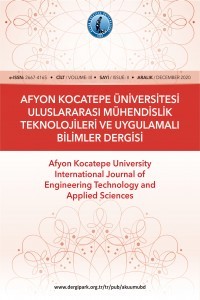Yüksek Gerilim Kablolarında k-NN ile Arıza Konumu Belirleme ve Veri Boyutunun Sınıflandırmaya Etkileri
Kısmi boşalma, yüksek gerilim, K-NN, arıza tanılama
Fault Location Detection with k-NN in High Voltage Cables and Effects of Data Size on Classification
Partial discharge, high voltage, K-NN, failure diagnostic.,
___
- Adhikari, N., and Kalla, U. K. (2020). Analysis of Partial Discharge Measurements in High Voltage XLPE Cable. In 2020 IEEE 9th Power India International Conference (PIICON) (pp. 1-5). IEEE.
- Cavallini, A., Montanar, G.C. and Puletti, F., 2007. A novel method to locate PD in polymeric cable systems based on amplitude-frequency (AF) map. IEEE Transactions on Dielectrics and Electrical Insulation, 14, 3, 726–734.
- Dukanac, D. (2018). Application of UHF method for partial discharge source location in power transformers. IEEE Transactions on Dielectrics and Electrical Insulation, 25(6), 2266-2278.
- Jahangir, H., Akbari, A., Werle, P., and Szczechowski, J. (2017). UHF PD measurements on power transformers-advantages and limitations. IEEE Transactions on Dielectrics and Electrical Insulation, 24(6), 3933-3940.
- Joseph, J., Mohan, S. and Krishnan, S.T., 2019. Numerical modelling, simulation and experimental validation of partial discharge in cross-linked polyethylene cables. IET Science, Measurement and Technology, 13, 2, 309–317.
- Khan, Q., Refaat, S.S., Abu-Rub, H., Toliyat, H.A., Olesz, M. and Darwish, A., 2021. Characterization of Defects Inside the Cable Dielectric With Partial Discharge Modeling. IEEE Transactions on Instrumentation and Measurement, 70, 1–11. Lan, S., Hu, Y.Q. and Kuo, C.C., 2019. Partial discharge location of power cables based on an improved phase difference method. IEEE Transactions on Dielectrics and Electrical Insulation, 26, 5, 1612 – 1619.
- Liu, F., Zhang, Y., Yao, X., Peng, Q., Nie, H., Li, J. and Zhou, Q., 2013. Recognition of PD mode based on KNN algorithm for converter transformer. Dianli Zidonghua Shebei/Electric Power Automation Equipment, 33, 5, 89–93.
- Mardiana, R. and Su, C.Q., 2010. Partial discharge location in power cables using a phase difference method. IEEE Transactions on Dielectrics and Electrical Insulation, 17, 6, 1738–1746.
- Mashikian, M.S., Bansal, R. and Northrop, R.B., 1990. Location and characterization of partial discharge sites in shielded power cables. IEEE Transaction Power Delivery, 5, 2, 833–839.
- Muhr, M. and Woschitz, R., 2000. Partial discharge diagnostic. Proceedings of the 6th International Conference on Properties and Applications of Dielectric Materials, 1, 223-226.
- Muslim, J., Susilo, A., Nishigouchi, K., Kozako, M., Hikita, M., Arief, Y. Z., and Khayam, U. (2013, September). Enhanced bowtie UHF antenna for detecting partial discharge in gas insulated substation. In 2013 48th International Universities' Power Engineering Conference (UPEC) (pp. 1-5). IEEE.
- Pattanadech, N. and Nimsanong, P., 2014. Effect of noise signals on partial discharge classification models. TENCON 2014 - 2014 IEEE Region 10 Conference, 1–5.
- Sheng, B., Zhou, C., Hepburn, D.M., Dong, X., Peers, G., Zhou, W. and Tang, Z., 2015. A novel on-line cable pd localisation method based on cable transfer function and detected pd pulse rise-time. IEEE Transactions on Dielectrics and Electrical Insulation, 22, 4, 2087–2096.
- Yii, C. C., Rohani, M. N. K. H., Isa, M., Hassan, S. I. S., Ismail, B., and Hussin, N. (2015, December). Multi-end partial discharge location algorithm based on trimmed mean data filtering technique for MV underground cable. In 2015 IEEE Student Conference on Research and Development (SCOReD) (pp. 345-350). IEEE
- Yayın Aralığı: Yılda 2 Sayı
- Başlangıç: 2018
- Yayıncı: Afyon Kocatepe Üniversitesi
AA6061 T6 Alüminyum Alaşımında Bilyeli Dövme İşleminin Mekanik Özelliklere Etkisinin İncelenmesi
MPPT Yöntemi ile İki Aşamalı Üç Fazlı Şebeke Bağlantılı Fotovoltaik Sistem
Mehmet DAYIOĞLU, Yüksel OĞUZ, Ahmet YÖNETKEN
112Sn(α, ) 116Te Reaksiyonu için Astrofiziksel S-Faktörlerinin ve Reaksiyon Hızlarının Hesaplanması
Ercan YILDIZ, Abdullah AYDIN, İsmail Hakkı SARPÜN
Erkek Çocuklarda I-131 Radyoizotopunun Vücut Dozunun Yaşa Göre Değişimi
Timur KOCA, İsmail Hakkı SARPÜN, Ünal YILDIRIR, İlkay TÜRK ÇAKIR, Selcan ŞAHİN
I-131 Radyoizotop Aktivitelerinin Nükleer Tıpta Kullanılan Organ Dozu Üzerine Etkisi
Timur KOCA, İsmail Hakkı SARPÜN, Cengiz ÖZSOY, Vedat AYDIN, Selcan ŞAHİN
RLBP Metodu ile Mamografi Görüntülerinin İncelenmesi ve Sınıflandırılması
Muhammed Mustafa KELEK, Enes CENGİZ, Yüksel OĞUZ, Ahmet YÖNETKEN
CT Taramalarında Hastanın kilosuna göre alınan dozun değişimi
İsmail Hakkı SARPÜN, Cengiz ÖZSOY, Vedat AYDIN, Timur KOCA
Kalp Krizi ve Alternatif tedaviler
